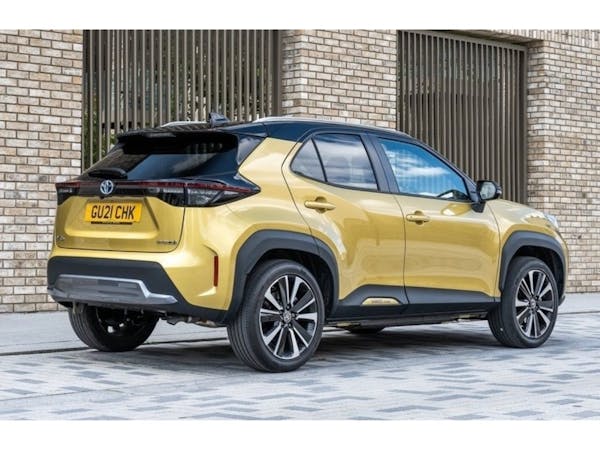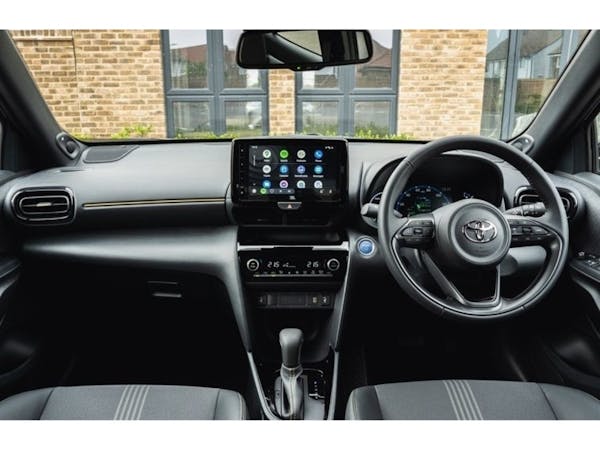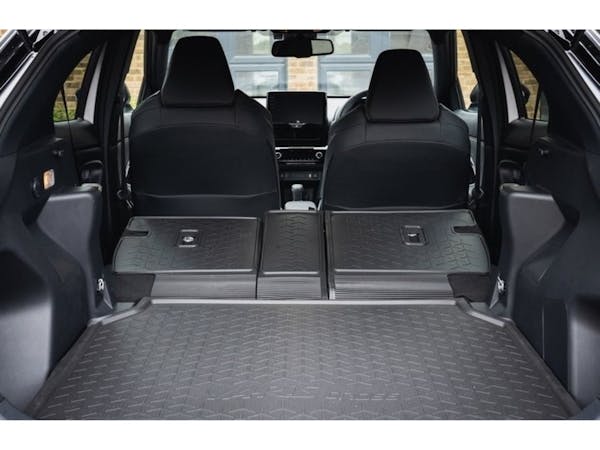
Toyota now has a credible, class-competitive supermini-sized SUV, filling an important gap in the company's crossover line-up. The Toyota Yaris Cross goes up against established rivals like the Nissan Juke and the Ford Puma, and aims to beat them with a great level of standard specification and features like full-Hybrid power, a CVT auto gearbox and optional AWD that are relatively unusual in this segment.
This month, these Toyota Yaris Cross models can be ordered through the Motability Scheme:




Search all the Toyota Yaris Cross Motability Advance Payment prices and trim levels for April, May and June 2024, or read our guide to the latest Motability price changes and updates here.
Toyota Yaris Cross Motability Advance Payment Offers
There are so many supermini-based crossover SUVs now on the market that you'd be forgiven for wondering whether any new entrant to this segment could possibly bring anything fresh to it. Sure enough, Toyota's description of its contender, the Yaris Cross, doesn't sound too promising in terms of innovation, this car aiming to offer 'the high riding qualities of an SUV but on a scale tailored to suit urban areas'. Just like any other Juke or Puma-sized small crossover then. Except that the Yaris Cross isn't just another small SUV. You can have it with 4WD for a start which, believe it or not, is pretty revolutionary in this normally front driven-only sector.
On top of that, for our market anyway, it comes only with a full-Hybrid engine. Not a token gesture mild hybrid like you'd get in, say, that rival Ford Puma or, perhaps, a Kia Stonic, but a full-fat petrol/electric powertrain that doesn't need plugging in but can run all-electrically some of the time. In this segment, there's not many others that can offer that.
Under the bonnet, the 1.5-litre full-Hybrid self-charging petrol/electric powerplant is of course the same one that's fitted to the conventional Yaris supermini, though here, Toyota claims, this 114bhp unit has been tuned with more of a focus on power delivery to make it feel more responsive to drive. It has to be had with the brand's usual CVT auto gearbox; other European markets get a conventional 1.5-litre non-electrified powertrain with a manual stick shift, but we won't see that here.
What we will get is something unusual in this class - the option of AWD. The 'Intelligent All-Wheel Drive' system in question is, as you'd expect, of the electric rather than the mechanical kind and operates in front wheel drive most of the time, sending drive to the rear wheels only when tractional needs really require it to. This AWD-i version gets a more sophisticated double-wishbone rear suspension set-up too, compared to the front wheel drive car's more basic torsion beam arrangement. All of this is bolted to the smallest version of the 'TNGA' 'Toyota New Global Architecture' platform. The hybrid system's all-electric capability is said to be 'generous', but don't take that to mean that the car will be able to travel on battery power for much more than a mile or so. Nevertheless, Toyota reckons that in urban use, this Yaris Cross will be operating without the aid of fossil fuel for the majority of the time.



Two words are supposed to sum up the look of this car; 'robust' and 'minimalistic'. The first references the design cues it shares with other Toyota SUVs - the RAV4-like squared-off wheel arches for instance. The second word is suggestive of this Yaris Cross model's dinky compact dimensions; it's 4,180mm long, 1,765mm wide and 1,560mm tall. To give you some class perspective, that makes it 6mm shorter than a Ford Puma but 45mm longer than a Nissan Juke.
Thankfully, this is more than a Yaris supermini with an SUV makeover. The wheelbase is 240mm longer, the ground clearance is 30mm higher and it's 90mm higher and 20mm wider. And there are some unique Yaris Cross styling details too - the way the exterior has been sculpted to feature a diamond shape when viewed from the top for instance. There are bigger wheels too, up to 18-inches in size.
Inside, the Yaris supermini parentage is much more obvious - even the door cards are the same. But there's differentiation too - the steering wheel, the instrumentation and the larger central touchscreen are all unique to the Yaris Cross, as is the useful storage bin added in the centre console. It's actually better packaged inside than a C-HR, a car which, though 200mm longer, offers less rear seat space than this, its cheaper showroom stablemate. There's a more practically-sized boot too, with features like an adjustable-height cargo floor, underfloor storage and Toyota's Belt Flex system for securing small items.
Expect a Yaris Cross to be pitched between the price of a Yaris Hybrid and a C-HR hybrid. As a result, base 'Icon' models sit in the £24,500 bracket, with the mid-range 'Design' spec costing from around £26,000. You'll need around £28,500 for plusher 'Excel' trim or sporty 'Dynamic'-spec, the later available with AWD-i 4-wheel drive for around £2,400 more. The top-spec 'GR Sport' sits at the top of the line-up. Across the range, safety has been prioritised. Standard advanced driver assistance systems include full speed-range intelligent adaptive cruise control and lane trace assist. Plus like the Yaris supermini, the Yaris Cross is the first car in its segment to be fitted with a centre airbag.
'Design' spec will suffice for most, with this model getting 17-inch wheels, smart entry & push-button start, Adaptive Cruise Control (ACC), automatic air conditioning, privacy glass, reversing camera, ambient lighting, LED Projector headlights and a smart multimedia system with smartphone integration including Apple CarPlay & Android Auto.
When it comes to frugality, this Yaris Cross can't match the 76.3mpg combined cycle fuel figure of its Yaris supermini showroom stablemate, but it won't be too far off that kind of level. Averaging over 60mpg on a regular basis should be comfortably possible. As for CO2, well expect a figure below 120g/km for front-wheel-drive versions, with the all-wheel-drive variants delivering a figure of below 135g/km.
Toyota needs this car - and needs it to sell well if projections of 150,000 European sales a year are to be realised - that's 8% of the B-SUV segment. The brand reckons that the entire Yaris range - supermini, GR hot hatch and this Crossover model - will, going forward, account for a third of all its European sales.
With every brand you can think of piling into the same sector with small lifestyle Crossovers, we can't help feeling these projections to be ambitious, but Toyota is an ambitious company and has given its rivals a pretty free run at this lucrative segment for far too long. You could argue that twenty years ago, the original three-door RAV4 pioneered this class of car, but the brand never properly capitalised on that model. Its modern day successor, the C-HR, has found favour but is too expensive for most Juke and Puma drivers. The Yaris Cross should suit their needs more precisely. And if it does, it'll suit Toyota even better.
People with a disability and carers who choose a new Toyota Yaris Cross through Motability will receive a brand new car, delivered by a Motability Specialist at a local Toyota dealership, complete with insurance, servicing and maintenance, full breakdown assistance, replacement tyre cover, windscreen repair or replacement cover plus a mileage allowance of 60,000 miles over three years.